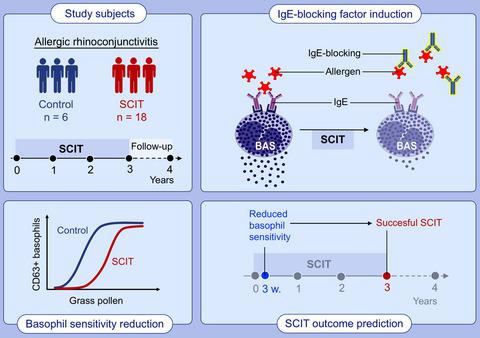Our official English website, www.x-mol.net, welcomes your
feedback! (Note: you will need to create a separate account there.)
Basophil Sensitivity Reflects the Long‐term Clinical Outcome of Subcutaneous Immunotherapy in Grass Pollen Allergic Patients
Allergy ( IF 12.6 ) Pub Date : 2020-03-07 , DOI: 10.1111/all.14264 Johannes Martin Schmid 1 , Peter A. Würtzen 2 , Premkumar Siddhuraj 3 , Prajakta Jogdand 3 , Claus Gregers Petersen 4 , Ronald Dahl 5 , Jonas S. Erjefält 3 , Hans Jürgen Hoffmann 6
Allergy ( IF 12.6 ) Pub Date : 2020-03-07 , DOI: 10.1111/all.14264 Johannes Martin Schmid 1 , Peter A. Würtzen 2 , Premkumar Siddhuraj 3 , Prajakta Jogdand 3 , Claus Gregers Petersen 4 , Ronald Dahl 5 , Jonas S. Erjefält 3 , Hans Jürgen Hoffmann 6
Affiliation

|
BACKGROUND
Allergic rhinoconjunctivitis is a public health problem. Allergen Immunotherapy is an effective and safe treatment, that modifies the natural course of allergic disease and induces long-term tolerance. OBJECTIVE
To correlate basophil and antibody biomarkers of subcutaneous immunotherapy to clinical outcomes and cellular changes in target tissue. METHODS
Adults suffering from allergic rhinoconjunctivitis due to grass pollen allergy were randomized to receive subcutaneous immunotherapy (n=18) or to an open control group (n=6). Patients reported daily symptom and medication scores and weekly rhinitis related quality of life scores during four pollen seasons. Biomarkers were measured every 3 months for three years treatment and every 6 months in the follow-up year. Nasal and cutaneous allergen challenge tests were performed annually. Leucocyte subsets were assessed in nasal mucosa biopsies at baseline and after treatment. RESULTS
Subcutaneous immunotherapy led to a 447-fold decrease in basophil sensitivity during the first treatment year. This remained hundredfold lower than baseline during the 3 year-treatment period and tenfold lower during the follow-up year (n=18, p=0.03). Decrease in basophil sensitivity after three weeks of treatment predicted long-term improvement in seasonal combined symptom and medication scores (ῥ=-0.69, p=0.0027) during three years of treatment. AUC of IgE blocking factor correlated to nasal allergen challenge (ῥ =0.63, p=0.0012) and SPT (ῥ =0.45, p=0.03). Plasma cell numbers in the nasal mucosa increased during treatment (p=0.02). CONCLUSION
Decrease in basophil sensitivity after three weeks of subcutaneous allergen immunotherapy predicted the clinical outcome of this treatment.
中文翻译:

嗜碱性粒细胞敏感性反映了草花粉过敏患者皮下免疫治疗的长期临床结果
背景过敏性鼻结膜炎是一个公共卫生问题。过敏原免疫疗法是一种有效且安全的治疗方法,可改变过敏性疾病的自然病程并诱导长期耐受。目的 将皮下免疫治疗的嗜碱性粒细胞和抗体生物标志物与临床结果和靶组织细胞变化相关联。方法 因草花粉过敏而患过敏性鼻结膜炎的成人随机接受皮下免疫治疗(n=18)或开放对照组(n=6)。患者报告了四个花粉季节期间的每日症状和药物评分以及每周鼻炎相关的生活质量评分。生物标志物在三年治疗中每 3 个月测量一次,在后续年份每 6 个月测量一次。每年进行鼻和皮肤过敏原激发试验。在基线和治疗后的鼻粘膜活检中评估了白细胞亚群。结果 皮下免疫治疗在第一个治疗年期间导致嗜碱性粒细胞敏感性降低 447 倍。在 3 年的治疗期间,这仍然比基线低 100 倍,在后续年中低 10 倍(n=18,p=0.03)。治疗三周后嗜碱性粒细胞敏感性的降低预测了三年治疗期间季节性综合症状和药物评分的长期改善(ῥ=-0.69,p=0.0027)。IgE 阻断因子的 AUC 与鼻过敏原激发 (ῥ =0.63, p=0.0012) 和 SPT (ῥ =0.45, p=0.03) 相关。治疗期间鼻粘膜中的浆细胞数量增加(p=0.02)。
更新日期:2020-03-07
中文翻译:

嗜碱性粒细胞敏感性反映了草花粉过敏患者皮下免疫治疗的长期临床结果
背景过敏性鼻结膜炎是一个公共卫生问题。过敏原免疫疗法是一种有效且安全的治疗方法,可改变过敏性疾病的自然病程并诱导长期耐受。目的 将皮下免疫治疗的嗜碱性粒细胞和抗体生物标志物与临床结果和靶组织细胞变化相关联。方法 因草花粉过敏而患过敏性鼻结膜炎的成人随机接受皮下免疫治疗(n=18)或开放对照组(n=6)。患者报告了四个花粉季节期间的每日症状和药物评分以及每周鼻炎相关的生活质量评分。生物标志物在三年治疗中每 3 个月测量一次,在后续年份每 6 个月测量一次。每年进行鼻和皮肤过敏原激发试验。在基线和治疗后的鼻粘膜活检中评估了白细胞亚群。结果 皮下免疫治疗在第一个治疗年期间导致嗜碱性粒细胞敏感性降低 447 倍。在 3 年的治疗期间,这仍然比基线低 100 倍,在后续年中低 10 倍(n=18,p=0.03)。治疗三周后嗜碱性粒细胞敏感性的降低预测了三年治疗期间季节性综合症状和药物评分的长期改善(ῥ=-0.69,p=0.0027)。IgE 阻断因子的 AUC 与鼻过敏原激发 (ῥ =0.63, p=0.0012) 和 SPT (ῥ =0.45, p=0.03) 相关。治疗期间鼻粘膜中的浆细胞数量增加(p=0.02)。











































 京公网安备 11010802027423号
京公网安备 11010802027423号